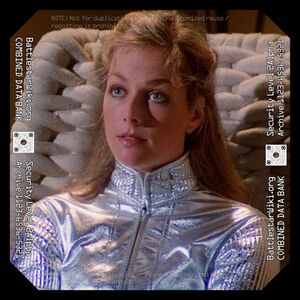Sarah Fowler: Difference between revisions
More actions
fragment -> sentence |
m remove stray . |
||
| Line 1: | Line 1: | ||
[[Image:SarahFowler.jpg|thumb|Sarah aboard the ''Lunar Avion'' | [[Image:SarahFowler.jpg|thumb|Sarah aboard the ''Lunar Avion'']] | ||
'''Sarah Fowler''' is a female born on one of the [[Lunar Colonies]]. Her father, John Russel Fowler, resided on the planet [[Paradeen]]. She has lost both her husband and mother. | '''Sarah Fowler''' is a female born on one of the [[Lunar Colonies]]. Her father, John Russel Fowler, resided on the planet [[Paradeen]]. She has lost both her husband and mother. | ||
Revision as of 17:40, 9 April 2006

Sarah Fowler is a female born on one of the Lunar Colonies. Her father, John Russel Fowler, resided on the planet Paradeen. She has lost both her husband and mother.
Biography
She and her three children, along with Michael and his only child, manage to escape the Lunar colony -- which is under the dominion of the Eastern Alliance -- on the Lunar Shuttle Avion. Their destination is Paradeen, where her father and his two androids, Hector and Vector, built a house for them to stay in. The plan is to get there, destroy the ship, and live out the rest of their lives without worrying about the Eastern Alliance. The plan might have worked without a hitch were they not encountered by the patrol of Apollo and Starbuck.
Sarah harbors negative, dismissive views on technology, due to the fact that she and her children were hindered by their inability to breathe in heavier atmospheres (thanks to Terran enhancements of those who wished to settle the Lunar colonies.) Due to this, she despises and feared all those who favor technology; though she doesn't seem to be able to back up her viewpoints (more of an ignorant bias, apparently) with any evidence. (It is unknown as to what exactly forces Sarah to bring along Michael in the first place, perhaps his knowledge of technology?)
When they are intercepted by Apollo and Starbuck, she is the first to be revived from suspended animation by Michael, who knows that they are not where they are supposed to be. After Michael's glorified asthmatic episode, he and Sarah are placed in chambers set to their atmosphere. With the help of Galactica's sympathetic crew, they are sent on to their destination, programmed automatically into the Avion's onboard computer.
After landing on Paradeen, and meandering about the surroundings, she discovers that her father died of natural causes. Later on, it is revealed to the Colonials (Cassiopeia, Starbuck and Apollo) that they were not related to one another at all. She proves to be over-protective of her children, doing her best to curtail all knowledge of Terra, for she didn't want her children knowing much about a planet they can never go back to.
She attempts a few advances on Apollo, expressing a wish to be, essentially, his wife. She expresses to him her fear of Michael, due to his views about technology. Later on she admits that she was the one who damaged all the equipment onboard the two Vipers, though they can be salvaged to assemble enough working controls for one Viper. By doing thus, she presumes that she would maroon Apollo on Paradeen, so that he could spend the rest his life with her and her children. Michael, of course, chastises her, though his mind is on the disappearance of Starbuck, who is lost in the catacombs of Paradeen City.
During the night, she and baby Walker are captured by the Leiter's Eastern Alliance's officers. She manages to reveal little, and is responsible for delaying the Eastern Alliance and effecting the escape of Baby Walker.
After the situation is resolved and the Easter Alliance enforcers are captured, she decides that she likes Michael and wants to stay with him (Greetings from Earth).
She was portrayed by Kelly Harmon.
Notes
- The last name of Sarah is assumed, given by the evidence provided by John Fowler's tombstone.
